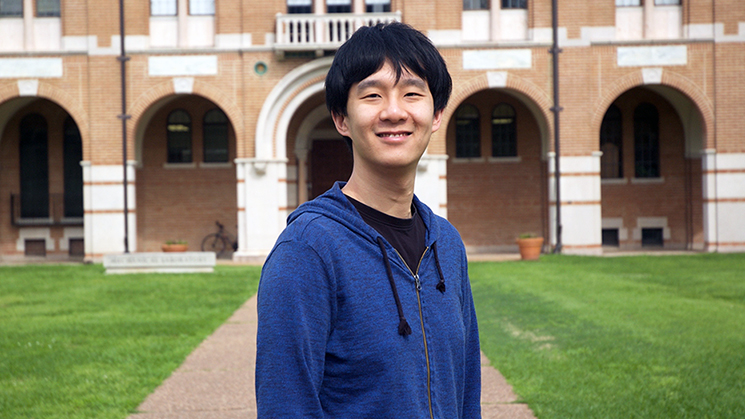 Sometimes, a simple question launches a career in robotics.
Sometimes, a simple question launches a career in robotics.
“One of my college professors asked me, ‘Hey, do you want to play with robots for the summer?’” said Keliang He, who quickly accepted the challenge. “I was like, sure, why the heck not, because who doesn’t want to play with robots?”
When it was time to find a graduate program, a visit to Rice University proved to be the best choice. The fifth-year graduate student in computer science (CS) noticed the size of the CS graduate program guaranteed great interaction with his advisor.
“For me, it all came down to where I felt most comfortable. I visited Rice and it felt really nice, it was not awkward. Plus, Lydia Kavraki is a big deal in robotics,” He said.
During his undergraduate years, He was an engineering student with a background in mathematics. Today he uses his skills in robotics research.
“I build plans and policies for robots to execute. I give the robot some high-level task, for example, ‘go get my Coke from the fridge.’ The robot has to figure out how to do that – what are the steps and what are the motions to carry out the task. I mainly focus on how to do it when there could be possible interferences by other agents. For example, what do you if someone is blocking your way or if somebody steals the Coke from you?” He said.
The robots were not the only ones overcoming obstacles. He needed to find an answer to a common graduate student problem: impostor syndrome.
“Sometimes projects go well, sometimes they do not. I started thinking about decisions I made, like the decision to come to graduate school. Once I got into those thoughts, I started not being able to focus on work well. It’s like a feedback loop: once you can’t focus, you get a little behind. When you get behind, you feel like you can’t do this anymore. That’s when you know impostor syndrome has hit you and you wonder why everyone else is so smart,” He said.
Going to the Rice Counseling Center proved helpful for He and so did talking to peers. Elizabeth Plummer, LCSW, Associate Director of the Rice Counseling Center, helps Rice students recognize and overcome barriers in academic progress.
“Typically, our students are accustomed to being a ‘big fish in a small pond.’ When they come to Rice and are surrounded by other ‘big fish’ for the first time, they may question if they are as successful or accomplished as their peers. They may hold on to the belief that their acceptance into their program was a mistake. They fear they will be discovered to be not intelligent or successful enough to actually deserve that acceptance,” Plummer said.
“We help students who are dealing with this issue by first helping them recognize that this cognitive distortion is occurring and then teach them some cognitive behavior techniques to challenge these thoughts,” she said.
Ph.D. alumnus Ryan Luna who is now a software engineer at Waymo, was instrumental in helping He overcome his obstacles.
“Keliang is a good friend. Not only is he a talented individual with a strong intuition for how things work, it was truly a pleasure to work with him at Rice. He was part of the first cohort of students that joined the lab after I arrived. After learning some hard lessons early in my tenure as a student, I made sure to have candid discussions about the expectations of graduate school and Ph.D. life with new grad students,” Luna said.
Luna battled impostor syndrome and decided to share his strategies with others.
“I had never heard of impostor syndrome before but it was a profound relief to learn that not only is it quite common, it is especially prevalent among graduate students. Ironically, one of the easiest ways to combat these feelings is to talk about it, yet these stresses are rarely discussed for fear of being “outed” as an impostor,” he said.
Graduate students in He’s team created a discussion group where members share tips on thriving in graduate school.
“Once a semester, senior students get together with younger students and we talk about these things just to make sure that everyone knows how to handle these problems. This (impostor syndrome) is something everyone goes through, and there are people to talk to when you need it,” He said.
After commencement, He will work for Microsoft as a software engineer. The time he spent at Rice helped him develop skills outside of the required CS curriculum.
“Rice has a lot of resources,” He said. “The ability to communicate about your work and manage the product you’re working on will take you much further than the technical stuff you learn.”
Cintia Listenbee, CS Publicist
Keliang He’s Ph.D. advisor is Lydia Kavraki; he matriculated in Fall 2013.